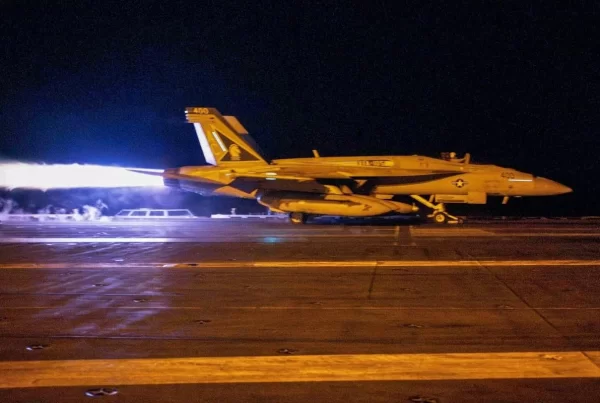NPR’s Robert Siegel speaks with Farea Al-Muslimi, who is reporting for NPR in the Yemeni capital of Sanaa and is also a visiting scholar with the Carnegie Foundation. He describes how the fighting in Yemen has created a humanitarian crisis inside the country.
ROBERT SIEGEL, HOST:
A coalition of Arab states led by Saudi Arabia is continuing with heavy airstrikes in the nation of Yemen. The Saudi leadership says it’s fighting an Iranian-backed rebel group, the Houthis, that’s taken over much of the country. The strikes have been underway for a week, and there are estimates that more than a hundred people have died. With each day, life is becoming more dangerous and more difficult for Yemen’s 24 million inhabitants. We’re joined now on the phone from the Yemeni capital of Sana’a by Farea Al-Muslimi. He’s reporting for NPR. He’s also a visiting fellow at the Carnegie Middle East Center. You’ve now been through a week of bombings there, much of it at night. What has it been like?
FAREA AL-MUSLIMI, BYLINE: Yes, Robert. It has been a sleepless seven nights in Yemen’s captial along with bombings and antiaircraft. Most of those who cannot flee the capital already dead. Most of those who could not flee are still inside, but there is no basements in Yemen as much as you would expect. There is less safe areas than probably would have been in any other capital being bombed. This is especially true as hospitals and schools are built next to military bases.
SIEGEL: You said that those who could flee have fled. Others cannot. Is it possible for – if someone is healthy – to just leave the city, or is it blocked?
AL-MUSLIMI: Yes, you can if you have enough fuel and car. At the same time, you need to realize that the whole country is actually shut down – all of the airports and seaports are now closed, and no one actually can flee Yemen at the moment in or out. In fact, many international humanitarian NGO’s have not been able to get their medical supplies because movement is not allowed. Yemen is slowly becoming a closed (unintelligible).
SIEGEL: Is food getting into Sana’a?
AL-MUSLIMI: There is – obviously in the market stores, there is less fresh vegetables. Overall, some of the prices of food have increased. This is especially important because the country depends mostly on bringing wheat from the outside – hundred percent. And it’s not clear what will this closure of ports also bring into Yemen. It will most likely bring famine to the country if it stays for too long.
SIEGEL: Is there electricity? Is there water for people in Sana’a?
AL-MUSLIMI: In the capital, electricity for the last five days did not exceed five hours per day. Goods are getting less, and shops are more closed. In other parts of the country like in Lahij in the south, cities have been without water or electricity for the last six days. In fact, most hospitals have run out of medical resources in the south, and there are dead bodies according to local eyewitnesses in different cities around the country. This is important because in addition to the airstrikes happening during day and night anywhere, anytime, there is huge clashes happening in the ground between the forces of al-Houthi and forces allied with former President Saleh and forces of current President Abd Rabbuh Mansur Hadi who is in (unintelligible).
SIEGEL: It must be terrifying for families with children, especially, at a time like this.
AL-MUSLIMI: Absolutely. I mean at the moment while I’m speaking, a few huge bombing is happening in Sana’a and also antiaircraft. It’s impossible how many thousands of children and women have to go through this every night – not actually been able sleep in addition to the overall fear happening in the country of schools closed, most public agencies – hospitals have shut, and also universities are closed. Most of the life is actually – in cities where the fighting is happening – has been equally paralyzed and frightening.
SIEGEL: Many, many years ago, Yemen was a regional battle that brought in other powers in the region, and that seems to be happening once again. Are people there concerned that their own country could become a battlefield for regional powers like Saudi Arabia and Iran?
AL-MUSLIMI: I think it is already becoming. For years it was, as you said, the proxy war for Saudi Arabia and Iran. Many Yemenis at the moment are afraid that it’s actually a direct war happening in the Yemeni land.
SIEGEL: Well, Farea, take care, and we hope that everyone stays safe as best they can.
AL-MUSLIMI: Thank you very much.
SIEGEL: That’s journalist Farea Al-Muslimi in Sana’a, the capital of Yemen.





